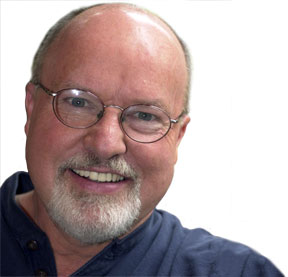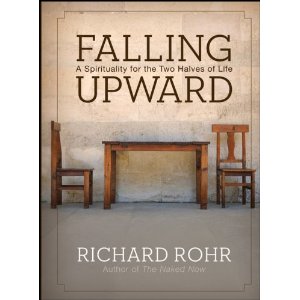Fr. Richard Rohr is a Franciscan priest. He was the founder of the New Jerusalem Community in Cincinnati, Ohio in 1971, and the Center for Action and Contemplation in Albuquerque, New Mexico in 1986, where he presently serves as Founding Director. He speaks and teaches on themes that include Scripture as liberation, the integration of action and contemplation, community building, peace and justice issues, male spirituality, the enneagram, and eco-spirituality. Fr. Rohr’s recent books include Falling Upward: Spirituality for the Two Halves of Life (2011), The Naked Now: Learning to See as the Mystics See (2009), and Things Hidden: Scripture as Spirituality (2008). He is a regular contributor to two magazines: Tikkun and Sojourners).
Falling Upward tells the story of the spiritual maturation across the life span. The spirituality of the first half of life is about constructing our spiritual container while the second half is concerned with filling it. Put another way, the spirituality of “the first half of life is about writing the text and the second half is writing commentary on that text” (p. 143). While the two halves always occur in order, they are not tied to any specific chronological age range: some people may remain in the first half throughout life while others may progress to the latter at a relatively young age. Since we live in a culture dominated by first half of life issues and that struggles to live with paradox, it is difficult for people to make the transition. The first half of one’s spiritual life is dominated by rules and regulations, marked by considerable attentiveness to correct rituals that guide one in the quest to know and do that which is right. The second is far freer, similar to Ricouer’s second naïveté. One cannot will one’s way forward, but rather finds the way down that path through falling and failing. In short, people tend to “grow spiritually much more by doing it wrong than by doing it right” (p.xxii). In the second half of life, both-and thinking dominates and it becomes possible to understand the richness of multiple meanings.
A book about how to progress from the first to the second half of one’s spiritual life misses what the journey of faith is all about. Rohr succeeds in his attempt to familiarize those residing on both halves with the relative strengths of their spiritual life stage while also generating awareness of the second stage for those now in the first. Careful not to construct an artificial path joining the two, he instead shows what the terrain is on either end of the path and suggests the path itself is one that must be experienced in full, including many falls and failures. Readers in the first half of their spiritual lives won’t find the second attractive, but will gain an awareness for just how different it is. Readers in the second half of their spiritual lives will be reminded of what they already experienced in the first half, encouraged not seek to return to it, and empowered to more fully experience the possibilities of the both-and perspective.
So What?
Many people have written about spiritual formation as a process. The best known stage theorist, James Fowler, regrets having chosen the term stages as the very language suggests a higher number is a better or somehow more desirable stage. Clearly, however, whatever vocabulary one uses there are substantive differences between stages or levels.
- Which of Rohr’s two stages (first half and second half of life) best describes your current experience? If you are in the latter half, at what age did you make the transition and what were some of the key falls or failures that helped you grow into this half? For those in the first stage, how well are you doing with the task of constructing a container? For those in the latter half, how much have you managed to fill it?
- Which of Fowler’s six stages best describes your current experience? What do you see as the greatest strengths of your current stage?
- How does understanding that people in other stages experience their faith quite differently help you as you seek to serve alongside a diverse group of people in your congregation?
Richard Rohr. Falling Upward: Spirituality for the Two Halves of Life. Jossey-Bass, 2011. ISBN: 9780470907757.

